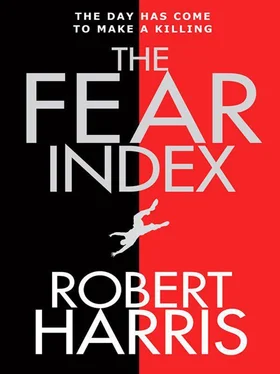Robert Harris - The Fear Index
Здесь есть возможность читать онлайн «Robert Harris - The Fear Index» весь текст электронной книги совершенно бесплатно (целиком полную версию без сокращений). В некоторых случаях можно слушать аудио, скачать через торрент в формате fb2 и присутствует краткое содержание. Жанр: Триллер, на английском языке. Описание произведения, (предисловие) а так же отзывы посетителей доступны на портале библиотеки ЛибКат.
- Название:The Fear Index
- Автор:
- Жанр:
- Год:неизвестен
- ISBN:нет данных
- Рейтинг книги:4 / 5. Голосов: 1
-
Избранное:Добавить в избранное
- Отзывы:
-
Ваша оценка:
- 80
- 1
- 2
- 3
- 4
- 5
The Fear Index: краткое содержание, описание и аннотация
Предлагаем к чтению аннотацию, описание, краткое содержание или предисловие (зависит от того, что написал сам автор книги «The Fear Index»). Если вы не нашли необходимую информацию о книге — напишите в комментариях, мы постараемся отыскать её.
The Fear Index — читать онлайн бесплатно полную книгу (весь текст) целиком
Ниже представлен текст книги, разбитый по страницам. Система сохранения места последней прочитанной страницы, позволяет с удобством читать онлайн бесплатно книгу «The Fear Index», без необходимости каждый раз заново искать на чём Вы остановились. Поставьте закладку, и сможете в любой момент перейти на страницу, на которой закончили чтение.
Интервал:
Закладка:
She smiled at the memory, and so did Leclerc – but for form’s sake, she suspected, to encourage her to keep talking. She wondered what he wanted.
‘Were you at CERN yourself?’
‘God, no, I was working as a secretary at the UN – your typical ex-art student with bad prospects and good French: that was me.’ She was talking too fast and grinning too much, she realised. He would think she was tipsy.
‘But Dr Hoffmann was still at CERN when you got to know him?’
‘He was in the process of leaving to set up his own company with his partner, a man called Hugo Quarry. We all met for the first time on the same night, oddly enough. Is this important?’
‘And why exactly did he do that, do you know – leave CERN?’
‘You’d have to ask him. Or Hugo.’
‘I will. He is American, this Mr Quarry?’
She laughed. ‘No, English. Very much so.’
‘I assume one reason Dr Hoffmann left CERN was because he wanted to make more money?’
‘No, not really. Money never bothered him. Not then, anyway. He told me he could pursue his line of research more easily if he had his own company.’
‘And what line was that?’
‘Artificial intelligence. But again, you’d have to ask him about the details. I’m afraid it’s always been way over my head.’
Leclerc paused.
‘Has he sought psychiatric help, do you know?’
The question startled her. ‘Not that I’m aware. Why do you ask?’
‘It’s just that I gather he suffered a nervous breakdown when he was at CERN, which someone there told me is the reason why he left. I wondered if there’d been any recurrence.’
She realised she was staring at him with her mouth open. She clamped her jaw shut.
He was studying her closely. He said, ‘I’m sorry. Have I spoken out of turn? You didn’t know that?’
She recovered her composure just enough to lie. ‘Well, of course I knew about it – I knew something about it.’ She was aware of how unconvincing she sounded. But what was the alternative? To admit that her husband was mostly a mystery to her – that an immense amount of what occupied his mind every day had always been impenetrable territory for her, and that this unknowable quality was both what had attracted her to him in the first place and what had frightened her ever since? ‘So you’ve been checking up on Alex?’ she said in a brittle voice. ‘Shouldn’t you be trying to find the man who attacked him?’
‘I have to investigate all the facts, madame,’ said Leclerc primly. ‘It may be that the assailant knew your husband in the past or had a grudge against him. I merely asked an acquaintance at CERN – off the record and in the strictest confidence, I do assure you – why he had left.’
‘And this person said he had had a breakdown, and now you think Alex may be making up this whole story about a mysterious attacker?’
‘No, I’m simply trying to understand all the circumstances.’ He emptied his glass in one swig. ‘I’m sorry – I should let you get back to your party.’
‘Would you like another drink?’
‘No.’ He pressed his fingers to his mouth and suppressed a burp. ‘I must get on. Thank you.’ He bowed slightly, in an old-fashioned way. ‘It really has been most interesting to see your work.’ He stopped and stared again at the executed murderer in his glass box. ‘What exactly did he do, this poor fellow?’
‘He killed an old man who caught him stealing his electric blanket. Shot him and stabbed him. He was on death row for twelve years. When his last appeal for clemency was turned down, he was executed by lethal injection.’
‘Barbaric,’ muttered Leclerc, although whether he meant the crime, the punishment, or what she had made out of it, she was not entirely sure.
AFTERWARDS LECLERC SAT in his car on the opposite side of the street, his notebook on his knee, writing down as much of what he had just been told as he could remember. Through the window of the gallery he could see people milling around Gabrielle, her small dark figure lent an occasional touch of glamour by a camera flash. He decided he rather liked her, which was more than he could say for her exhibition. Three thousand francs for a few bits of glass with a horse’s skull scribbled on them? He blew out his cheeks. Dear God, one could buy a decent working animal – the whole thing, mark you, not just the head – for half that amount.
He finished writing and flicked back and forth through his notes, as if by a process of random association he might find some clue that had so far eluded him. His friend at CERN had taken a quick look at Hoffmann’s personnel file and Leclerc had jotted down the highlights: that Hoffmann had joined the team operating the Large Electron-Positron Collider at the age of twenty-seven, one of the few Americans seconded to the project at that time; that his head of section had considered him one of the most brilliant mathematicians on site; that he had switched from the construction of the new particle accelerator, the Large Hadron Collider, to the design of the software and computer systems needed to analyse the billions of pieces of data generated by the experiments; that after a prolonged period of overwork his behaviour had become sufficiently erratic for his fellow workers to complain, and he had been asked to leave the facility by the security department; and that finally after extensive sick leave his contract had been terminated.
Leclerc was fairly sure that her husband’s mental breakdown had come as news to Gabrielle Hoffmann: another of her endearing qualities was an obvious inability to lie. So it seemed Hoffmann was a mystery to everyone – his fellow scientists, the financial world, even his wife. He circled the name of Hugo Quarry.
His thoughts were interrupted by the noise of a powerful engine, and he glanced across the road to see a big charcoal-coloured Mercedes with its headlights on pulling up outside the gallery. Even before it had come to a stop, a bull-like figure in a dark suit jumped out of the front passenger seat, quickly checked the road ahead and behind and then opened the rear door. The people on the pavement, with their drinks and cigarettes, turned round lazily to see who was emerging, then looked away without interest as the unknown newcomer was escorted swiftly through the doors.
9
Even when we are quite alone, how often do we think with pleasure or pain of what others think of us – of their imagined approbation or disapprobation; and this all follows from sympathy, a fundamental element of the social instincts. A man who possessed no trace of such instincts would be an unnatural monster.
CHARLES DARWIN, The Descent of Man (1871)Hoffmann’s non-existent public profile had not been achieved without effort. One day, quite early in the history of Hoffmann Investment Technologies, when the company still only had about two billion dollars in assets under management, he had invited the partners of Switzerland’s oldest public-relations firm to breakfast at the Hotel President Wilson and offered them a deal: an annual retainer of 200,000 Swiss francs in return for keeping his name out of the papers. He set only one condition: if by any chance he was mentioned, he would deduct 10,000 francs from their fee; if he was mentioned more than twenty times in a year, they would have to start paying him. After a lengthy discussion, the partners accepted his terms and reversed all the advice they normally gave their clients. Hoffmann made no public charitable donations, attended no gala dinners or industry awards ceremonies, cultivated no journalists, appeared on no newspaper’s rich list, endorsed no political party, endowed no educational institution and gave no lectures or speeches. The occasional curious journalist was steered for background to the hedge fund’s prime brokers, who were always happy to take the credit for its success, or – in cases of extreme persistence – to Quarry. The partners had always kept their full fee and Hoffmann his anonymity.
Читать дальшеИнтервал:
Закладка:
Похожие книги на «The Fear Index»
Представляем Вашему вниманию похожие книги на «The Fear Index» списком для выбора. Мы отобрали схожую по названию и смыслу литературу в надежде предоставить читателям больше вариантов отыскать новые, интересные, ещё непрочитанные произведения.
Обсуждение, отзывы о книге «The Fear Index» и просто собственные мнения читателей. Оставьте ваши комментарии, напишите, что Вы думаете о произведении, его смысле или главных героях. Укажите что конкретно понравилось, а что нет, и почему Вы так считаете.










